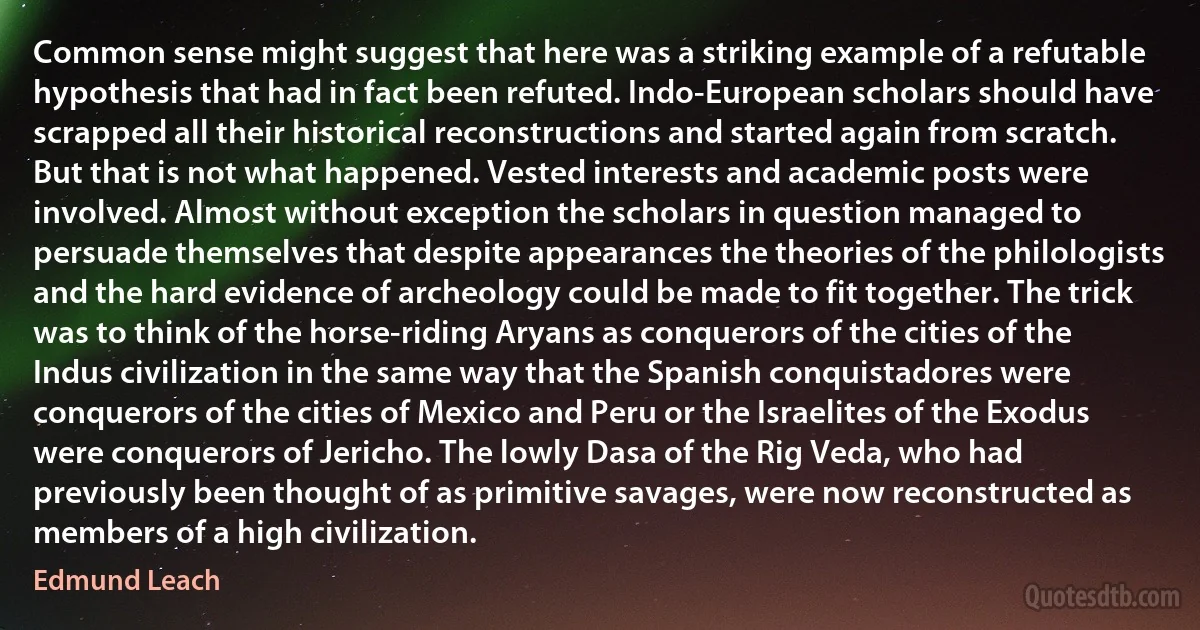
Common sense might suggest that here was a striking example of a refutable hypothesis that had in fact been refuted. Indo-European scholars should have scrapped all their historical reconstructions and started again from scratch. But that is not what happened. Vested interests and academic posts were involved. Almost without exception the scholars in question managed to persuade themselves that despite appearances the theories of the philologists and the hard evidence of archeology could be made to fit together. The trick was to think of the horse-riding Aryans as conquerors of the cities of the Indus civilization in the same way that the Spanish conquistadores were conquerors of the cities of Mexico and Peru or the Israelites of the Exodus were conquerors of Jericho. The lowly Dasa of the Rig Veda, who had previously been thought of as primitive savages, were now reconstructed as members of a high civilization.
Edmund LeachRelated topics
academic almost archeology common example exception exodus fit hard high historical hypothesis indo-european might now primitive question rig scrap scratch sense should thought think trick veda way Mexico Indus Israelites PeruRelated quotes
In primitive society the rules of ceremonial purity observed by divine kings, chiefs, and priests agree in many respects with the rules observed by homicides, mourners, women in childbed, girls at puberty, hunters and fishermen, and so on. To us these various classes of persons appear to differ totally in character and condition; some of them we should call holy, others we might pronounce unclean and polluted. But the savage makes no such moral distinction between them; the conceptions of holiness and pollution are not yet differentiated in his mind. To him the common feature of all these persons is that they are dangerous and in danger, and the danger in which they stand and to which they expose others is what we should call spiritual or ghostly, and therefore imaginary. The danger, however, is not less real because it is imaginary; imagination acts upon man as really does gravitation, and may kill him as certainly as a dose of prussic acid.

James Frazer
What makes you think human beings are sentient and aware? There's no evidence for it. Human beings never think for themselves, they find it too uncomfortable. For the most part, members of our species simply repeat what they are told-and become upset if they are exposed to any different view. The characteristic human trait is not awareness but conformity, and the characteristic result is religious warfare. Other animals fight for territory or food; but, uniquely in the animal kingdom, human beings fight for their 'beliefs.' The reason is that beliefs guide behavior which has evolutionary importance among human beings. But at a time when our behavior may well lead us to extinction, I see no reason to assume we have any awareness at all. We are stubborn, self-destructive conformists. Any other view of our species is just a self-congratulatory delusion. Next question.

Michael Crichton
I returned to civilization shortly after that and went to Cornell to teach, and my first impression was a very strange one. I can't understand it any more, but I felt very strongly then. I sat in a restaurant in New York, for example, and I looked out at the buildings and I began to think, you know, about how much the radius of the Hiroshima bomb damage was and so forth... How far from here was 34th street?... All those buildings, all smashed - and so on. And I would go along and I would see people building a bridge, or they'd be making a new road, and I thought, they're crazy, they just don't understand, they don't understand. Why are they making new things? It's so useless. But, fortunately, it's been useless for almost forty years now, hasn't it? So I've been wrong about it being useless making bridges and I'm glad those other people had the sense to go ahead.

Richard Feynman
Some scoffers have asked, "Where are the pre-Flood civilizations? If there was an entire civilization that was destroyed in the Flood of Noah, why don't we find their cities, highways or machines as we dig in the earth?” That's a fair question, but it is based on a false premise. What type of stuff would they need in a perfect world? If the weather was perfect and the animals were friendly and food was abundant and free and everyone was vegetarian, what would they need? They wouldn't need houses to be protected from weather, climate, or animals. I don't see why they would need buildings of any kind! If the earth was producing enormous quantities of food from pole to pole, they wouldn't need tractors, plows nor a highway system, nor vehicles to move food and goods from one region to another. They wouldn't need lots of things we need for survival and protection today.

Kent Hovind
Would you like to know, for instance, to what extent higher mathematics is used in our two great industries? Well, it is never used at all. Having found this to be the case in my own experience, after quite a long career, I wondered whether I was not an exception; so I made enquiries, and I found that it was a general rule that neither engineers nor managers used higher mathematics in carrying out their duties. We must, of course, learn mathematics that goes without saying but the question is how much must we learn? Up to the present this point has nearly always been decided simply by professors, but it seems to me to be a question in which professors do not count very much, and in which they count less as they become more learned and more devoted to their work. They would like to pass on all their scientific knowledge and they find that their pupils always leave them too soon.

Henri Fayol
